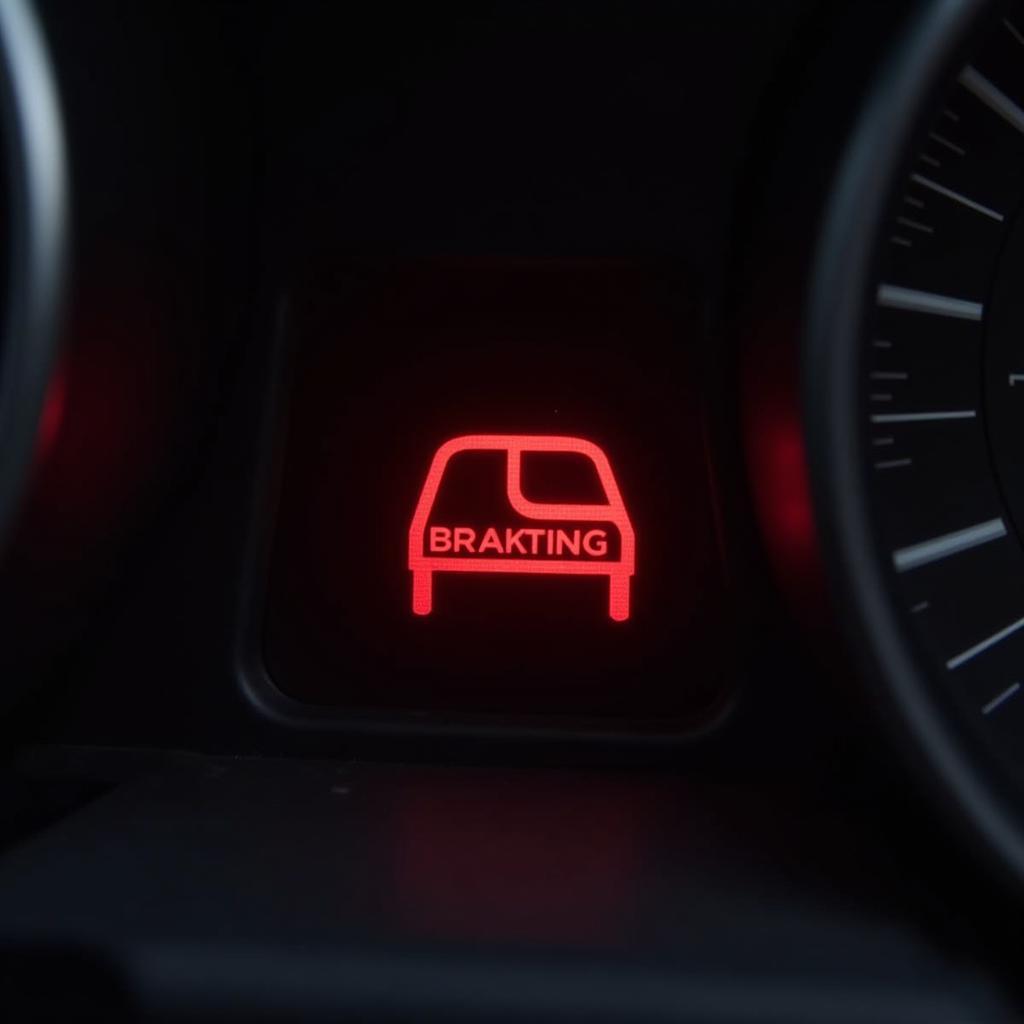The brake warning sound in your VW Passat is a crucial safety feature, designed to alert you of potential issues. However, there are instances where you might need to temporarily disable it, such as when working on the car’s braking system. This comprehensive guide will walk you through the reasons behind this warning sound, when disabling it might be necessary, and the potential risks involved.
 VW Passat Brake Warning Light
VW Passat Brake Warning Light
Understanding Your VW Passat’s Brake Warning Sound
Your VW Passat employs a sophisticated system of sensors and electronics to ensure optimal braking performance. The brake warning sound usually indicates one or more of the following:
- Worn Brake Pads: This is the most common reason for the warning sound.
- Low Brake Fluid Level: Insufficient brake fluid can severely impact braking performance.
- Faulty Brake Sensor: A malfunctioning sensor can trigger a false warning.
- Issues with the ABS System: While less frequent, problems with the Anti-lock Braking System (ABS) can also activate the warning.
When Disabling the Brake Warning Sound Might Be Necessary
While it is generally not recommended to disable the brake warning sound, certain situations might require it, such as:
- Replacing Brake Pads: When installing new brake pads, you need to compress the caliper piston, which can trigger the warning sound.
- Bleeding the Brake System: This procedure involves opening the brake lines, which can lower the brake fluid level and activate the warning.
- Performing Diagnostic Tests: Disabling the sound temporarily can be necessary when running specific diagnostic tests on the braking system.
“It’s crucial to remember that disabling the brake warning sound should only be done temporarily and in controlled environments. Always prioritize safety and address the underlying issue prompting the warning as soon as possible,” says Mark Stevenson, Senior Automotive Engineer at German Auto Solutions.
Risks of Driving with a Disabled Brake Warning Sound
Driving with a deactivated brake warning sound can be extremely dangerous. Ignoring the warning signs can lead to:
- Complete Brake Failure: Driving with worn brake pads or low brake fluid significantly increases the risk of brake failure, leading to accidents.
- Reduced Braking Efficiency: A compromised braking system can reduce braking efficiency, increasing stopping distances and the likelihood of collisions.
- Increased Risk of Accidents: Without the audible warning, you might be unaware of a developing brake problem until it’s too late.
 VW Passat Brake System Inspection
VW Passat Brake System Inspection
How to Disable the VW Passat Brake Warning Sound
Important: The following steps are for informational purposes only. Disabling the brake warning sound is not recommended unless absolutely necessary and should only be performed by qualified individuals.
The method for disabling the warning sound varies depending on the model year and specific configuration of your VW Passat.
- Consult Your Owner’s Manual: Your owner’s manual provides model-specific instructions and precautions.
- Use a Diagnostic Scanner: Professional-grade diagnostic scanners offer the ability to temporarily disable specific warning systems, including the brake warning sound.
- Disconnect the Warning Sound Circuit: This method requires advanced automotive knowledge and involves disconnecting the wire harness connected to the brake warning sound module.
“Always remember to reconnect the warning sound system and address the root cause of the warning as soon as you have completed the necessary repairs or maintenance,” advises Stevenson.
Best Practices After Disabling the Warning Sound
- Reconnect Immediately: After completing the task that required disabling the warning sound, immediately reconnect the system.
- Double-Check Your Work: Ensure all connections are secure and the braking system functions correctly.
- Test Your Brakes: Before driving, find a safe location to test your brakes thoroughly.
This guide provides a general overview of disabling the VW Passat brake warning sound. However, due to the technical nature of this procedure, seeking assistance from a qualified mechanic or automotive electrician is highly recommended.
Remember, your safety and the safety of others on the road is paramount. Never ignore or permanently disable safety-critical warning systems in your vehicle.

